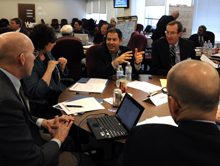The Center for Technology in Government and the National Association of State Chief Information Officers Collaborate on Agenda-Setting Workshop
Feb. 25, 2010
(518) 442-3892

A group of leading social and information scientists and government practitioners met at the National Science Foundation (NSF) to lay out a research agenda to address grand challenges in information, technology, and governance.
Albany, NY - A group of leading social and information scientists and government practitioners met at the National Science Foundation (NSF) to lay out a research agenda to address grand challenges in information, technology, and governance. The National Association of State Chief Information Officers (NASCIO) co-sponsored the workshop with the National Science Foundation (NSF) to launch a new multi-sector conversation about the way technology and social forces shape the workings of government.
The Center for Technology in Government (CTG) at the University at Albany led the organizing effort of this two-day workshop of over 40 participants from across the country. “The workshop brought together a diverse community of research and practice professionals to focus on the interaction between context and technology and to develop new interdisciplinary and multi-sector approaches to examining these interactions,” said Theresa Pardo, director of CTG.
"Fifteen years after the appearance of the Web and the Internet, government is engaged in the use of new information technologies as key to fulfilling their missions; society is demanding an efficient and responsive government. The seamless and trustworthy eGovernment we all want, requires the collaboration of the public and private sectors, married to the innovation of universities and laboratories. The goal is speedy transition from lab to product, but to do this we must take a fresh look at the amount of federal research dollars available for this work and potentially implement alternative funding models,” said Lawrence Brandt, former program officer for the NSF Digital Government Program, now with the National Coordination Office (NCO) for Networking and Information Technology Research and Development (NITRD).
The workshop participants engaged in a number of discussions focused on:
- Understanding the multiple contexts in which government and governance operate and how those contexts matter in technology adoption, use, and impact.
- Leveraging the knowledge and expertise of the workshop participants about how value, risks, and complexity are understood and addressed by government decision makers and managers.
- Recommending research themes, designs, and funding criteria for future work that will have both scholarly and practical value.
H. Jochen Scholl, associate professor, University of Washington, president of the Digital Government Society of North America (DGSNA), and member of the workshop organizing committee, stated that “advances in technology, together with the significant role new technologies are playing in government and society, demand a fresh consideration of a digital government research agenda and of the mechanisms in place to support it.”
Douglas Robinson, executive director of the National Association of State Chief Information Officers (NASCIO) said, “this was an important event where government researchers and practitioners pushed the boundaries of their collective understanding, laying the groundwork for more practice–oriented research.”
For more information, go to: www.ctg.albany.edu/projects/grandchallenges. A full workshop report is due by summer 2010.
The mission of the Center for Technology in Government at the University at Albany is to foster public sector innovation, enhance capability, generate public value, and support good governance. We carry out this mission through applied research, knowledge sharing, and collaboration at the intersection of policy, management, and technology.
The University at Albany-SUNY has a broad mission of excellence in undergraduate and graduate education, life-enhancing research and scholarship, and a commitment to public service. A University at Albany education brings the world within reach to students through nine schools and colleges, and an honors college. A student body of more than 17,000 students has a global connection to more than 140,000 alumni. For more information about this internationally ranked institution, visit www.albany.edu. For UAlbany's extensive roster of faculty experts, visit www.albany.edu/news/experts.php.
NASCIO is the premier network and resource for state CIOs and a leading advocate for technology policy at all levels of government. NASCIO represents state chief information officers and information technology executives from the states, territories, and the District of Columbia. The primary state government members are senior officials who have executive level and statewide responsibility for information technology leadership. State officials who are involved in agency level information technology management may participate as state members. Representatives from other public sector and non-profit organizations may also participate as associate members. Private sector firms may join as corporate members and participate in the Corporate Leadership Council. For more information about NASCIO visit www.nascio.org.